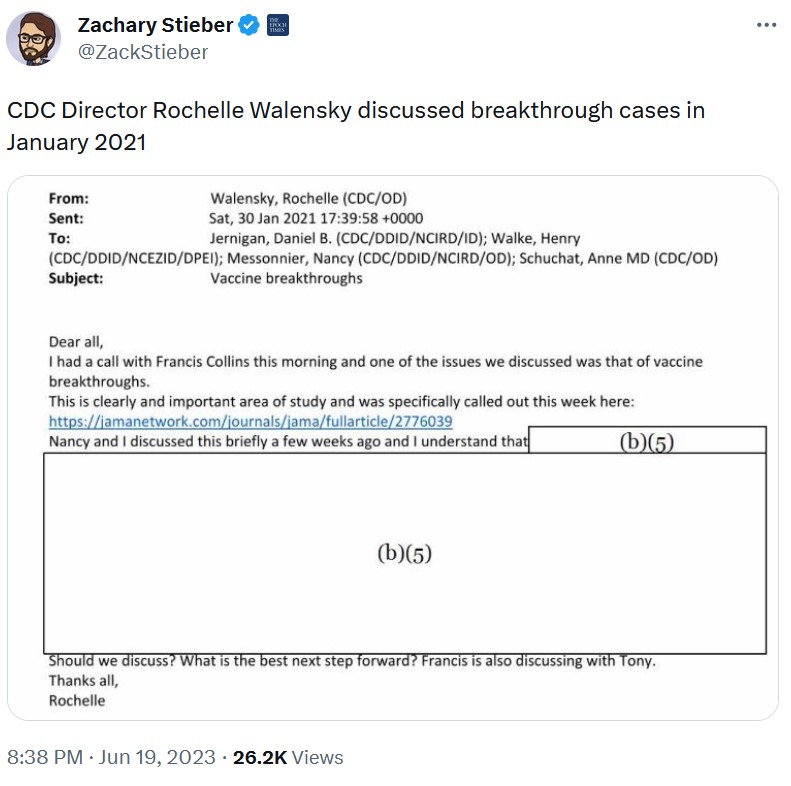


"Breakthrough cases" are, if you've forgotten, cases where a supposedly "vaccinated" person gets sick with the illness he was "vaccinated" against anyway.
And Rachel Walensky knew this was happening at least as early as January 2021:
That's a FOIA'd document that was just shaken free from the government's greedy, corrupt pockets -- but notice how much they're still hiding.
Rachel Walensky was asked in Congress why she repeatedly lied and claimed that the vaccines stopped infection.
She says that because the vaccines worked "initially" (at a 96% rate, which is still leaky). So I guess that means she was justified in continuing to lie throughout 2021?
Yes, that's what she's saying: My initial false statements were not lies because the initial findings (sort of) supported my initial false statements. And then when I kept making those false statements with full knowledge they were false, they were "grandfathered in" by my prior ignorance.
You're allowed to do that in court, right? The special Grandfathered Lie exception to the law against perjury?
Meanwhile, the UK is conducting an inquiry into its own covid response. The US, notice, is decidedly not conducting a similar inquiry.
The Regime's home base is the US, and The Regime will not permit the US government to examine the actions and choices made by The Regime.
The UK covid inquiry finds that the government acted hastily in shutting down the country, without considering the costs of doing so -- or the benefits of less draconian alternatives.
National lockdowns were given "very little thought" ahead of the pandemic and there was a failure to consider the "potentially massive impact" that restrictions on civil liberties would have, the Covid Inquiry has heard.
As the inquiry held its first full hearing two years after it was first announced, Baroness Heather Hallett, who chairs it, was told the country was not prepared for the pandemic and that local health officials found out details of restrictions at the same time as the public.
Giving an opening statement to the hearing, Hugo Keith KC, counsel for the inquiry, said there had been "very little debate pre-pandemic" around whether a lockdown might be necessary and how it could be avoided.
The UK first went into lockdown in March 2020, and there were two subsequent lockdowns, in November that year and January 2021, but Mr Keith said little consideration had been given to such extreme measures before then.
He told the inquiry: "Extraordinary though it may seem, given that it's a word that's forever seared in the nation's consciousness, there was very little debate pre-pandemic of whether a lockdown might prove to be necessary in the event of a runaway virus, let alone how a lockdown could be avoided.
"Very little thought was given to how, if it proved to be necessary, something as complex, difficult and damaging as a national lockdown could be put in place at all.
"Equally, there appears to have been a failure to think through the potentially massive impact on education and on the economy in trying to control a runaway virus in this way."
...
Mr Keith said that by March 26 2020, "the pandemic had the country in its grip", with almost every area of public life, including education, work, travel, the majority of public services and family life, being affected.
He added: "The hospitality, retail, travel and tourism, arts and culture, and the sport and leisure sectors effectively ceased, even places of worship closed.
"As you know, for very many, what they had to deal with went far beyond the curtailment of their normal lives and involved bereavement, serious illness, deprivation, mental illness, exposure to violence at home, terrible financial loss, loneliness and many other forms of suffering."
